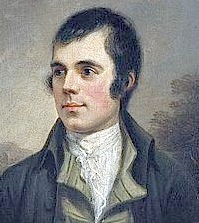Celebrating Robert Burns National Poet of Scotland 25th January
Robert Burns was born in the scottish village of Alloway (Scottish Gaelic Allmhaigh) on January 25, 1759. The eldest of the seven children of William Burnes (1721–1784), a tenant farmer from Dunnottar in the Mearns, and Agnes Broun (1732–1820), the daughter of a Kirkoswald tenant farmer. His parents ensured that their son received a relatively good education. He died at the age of 37 on 21 July 1796 and his Mausoleum is at St Michael’s churchyard in Dumfries (Scottish Gaelic: Dùn Phris). Throughout his life he was a practising poet and wrote many poems, lyrics and other pieces. Including those based on folk songs and traditions of his local area and those he had collected from throughout Scotland.
He also addressed political and civil issues at a time when the political scene in Scotland was in flux. Much of which was the result of the 1603 and 1707 unions. The disastrous 1707 union saw the Kingdom of England and the Kingdom of Scotland, which at the time were separate states with separate legislatures, but with the same monarch, brought into one Kingdom under the name of Great Britain. A union that stripped Scotland of its autonomy and finally all but muzzled the Scottish voice. Robert Burns in describing the betrayal of those who agreed to the union wrote: 'We are bought and sold for English gold. Such a parcel of rogues in a nation.' Robert Burns success as poet and songwriter, owed much to the way he responded to the world around him. Between 1780 and 1830 there was an enormous shift from agriculture to industry that radically altered social arrangements and exacerbated social inequities. Many small tenant farmers foundered during the transition, including both Burns and his father.
Robert Burns expressed sympathy with the French and American Revolutions and the advocates of reform and votes for all men. His mixture of support for freedom and against authority, were combined with his individualism, and his interest in traditional songs and legends. The coming together of cultural and political movements are not unusual, as can be seen in Ireland and indeed other Celtic nations. Robert Burns in using humour and satire, in writing thought provoking poems, along with traditional ballads and romantic songs make his style instantly recognisable. Recognised as the national poet of Scotland, Burns Day and Burns Night on 25th January is celebrated in Scotland and worldwide.






